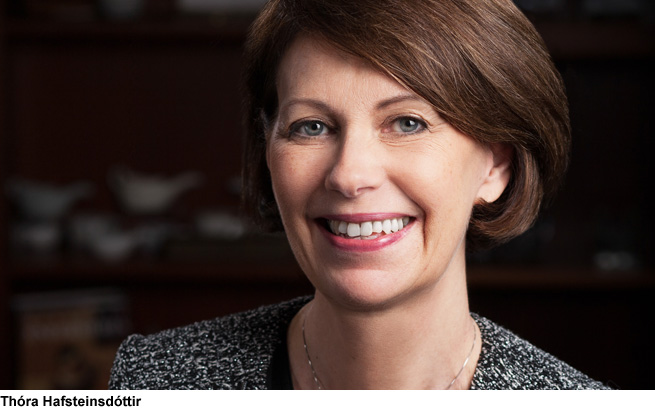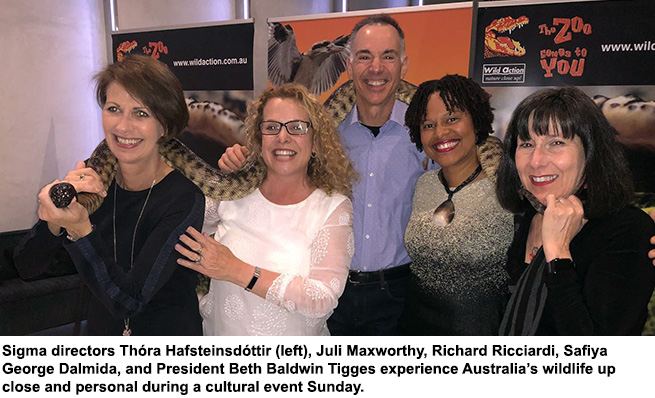Thóra B. Hafsteinsdóttir | 7/21/2018
What’s not to like?

A native of Iceland who now lives in the Netherlands shares highlights of Sigma’s 29th International Nursing Research Congress in Australia.
Looking back on my first day at Sigma’s International Nursing Research Congress here in Melbourne: The theme is “Innovative Global Nursing Practice and Education Through Research and Evidence-Based Practice.” As the theme suggests, the objective is to explore innovative research and evidence-based practice strategies that improve global health and outcomes. It really is exciting to take part in these annual Sigma events. These congresses are held in various locations around the world, and I have been fortunate to visit some of them, including Prague in 2013 and Dublin in 2017. Each time I visit another country, I want to look into the history of that country while reflecting, at the same time, on my own Icelandic roots. (I currently live in the Netherlands, so am becoming partly Dutch.)
Opening plenary
Safiya George Dalmida, a fellow member of Sigma’s board of directors, graciously chaired Thursday’s opening plenary session. After the Education Research Awards were presented, she introduced Debra Thoms, RN, RM, FACN (DLF), FACHSM (Hon), chief nursing and midwifery officer of Australia. Her lecture, titled “Of kangaroos, koalas, and platypi,” included information on the history of Australia, including its political structure, history of nursing, organization of healthcare, and health of Australians, and I came to realize how little I actually know about this country that we Europeans refer to as Down Under.
What a history! Aboriginal people, believed to have arrived in Australia at least 50,000 years ago, have the oldest continuous culture on earth. When Europeans settled in Australia, up to one million aboriginal people were living there as hunters and gatherers. Scattered across the continent in 500 clans or “nations,” they spoke about 700 languages.
When Australia became a British colony in 1770, it was already known as New Holland, so named in 1664 by Dutch explorer, seafarer, and merchant Abel Tazman Janszoon. The Dutch have have long been influential in global history.
Under British rule, Australia was an outpost, a penal colony. By 1868, more than 160,000 men and women had been transported here from Britain as convicts. Life for those prisoners was harsh. Male offenders were treated brutally and could be hanged for petty crimes, such as stealing, and women, outnumbered five to one, lived under constant threat of sexual exploitation.
Since then, of course, Australia has developed fast and now ranks among the best countries in the world to live in. In addition to high life expectancy for both women and men, it has a high level of education and research and a high rate of participation in sporting activities. This was, indeed, a very informative and lively lecture.
HIV care in South Africa and South Florida
Later in the day, I moderated a session that featured interesting presentations on mobile interventions to improve HIV care in South Africa, where providing such care is complicated by a variety of barriers. After interviewing patients and healthcare professionals, including nurses, researcher Lisa Michelle DiAndreth, MSN, MPH, identified barriers that included individual issues, e.g., transport hurdles and not wanting to know what is wrong; interpersonal issues, e.g., not being able to leave work for control; community issues, e.g., not wanting neighbors to know; and health system issues, e.g., clinics running out of medicine or clients encountering difficulty in contacting clinics for results.
Also on Thursday, a presentation titled “Adaptation and pilot testing of SEPA intervention for Hispanic Women and Men in South Florida” was given by Nilda “Nena” Peragallo Montano, [SEPA is an acronym for—in Spanish—Salud, Educación, Prevención, and Autocuidado, which translates in English to health, education, prevention, and self-care.] This presentation also highlighted the huge complexities of providing educational interventions to these populations. Conducting a mixed methods study, the researchers collected information about HIV risk factors and preferences to adapt SEPA intervention to the needs of Hispanic men and women.
The qualitative portion of the study revealed that Hispanic men and women are at high risk of acquiring HIV and that there is a lack of interventions tailored to them. Both men and women said they would feel comfortable sharing SEPA intervention sessions with other men and women, but only if their partners were not in the same group. Participants found the intervention feasible and acceptable. The findings highlight the importance of developing culture-specific interventions to prevent HIV among Hispanic women and men in the United States.
A great global get-together!
Although the primary objective of congress is to share research and explore ideas for improving patient outcomes, another important benefit is the opportunity that congress provides for networking—meeting colleagues from other countries, sharing perspectives, and discussing things. And that’s what I have been doing. Meeting with Australian nurses as well as nurses from Taiwan, the Philippines, the Netherlands, the United States, and Canada, we’ve exchanged ideas on a wide range of nursing topics that include evidence-based practice, teaching, and research. All this, while enjoying a positive atmosphere of support and encouragement and discovering Melbourne’s culture, wonderful food, and great coffee. Next week, we travel and enjoy the beauty of Sydney and Brisbane.
To my fellow attendees, I hope you’re enjoying the conference as much as I am.

Thóra B. Hafsteinsdóttir, PhD, RN, is senior researcher and course coordinator in the Nursing Science Department, Julius Center for Health Sciences and Primary Care, University Medical Center Utrecht, Utrecht, Netherlands. Hafsteinsdóttir is also professor of nursing, Faculty of Nursing, University of Iceland, and board director, Honor Society of Nursing, Sigma Theta Tau International.